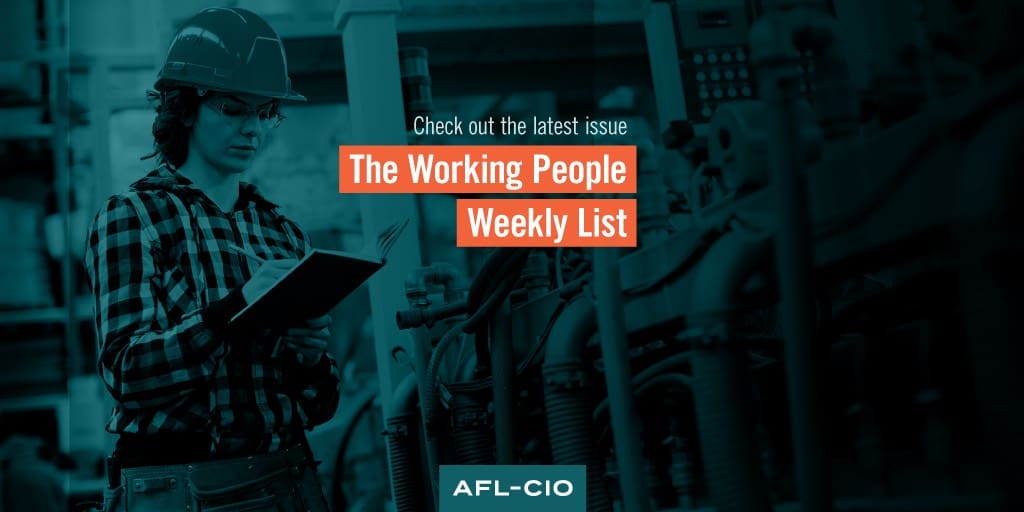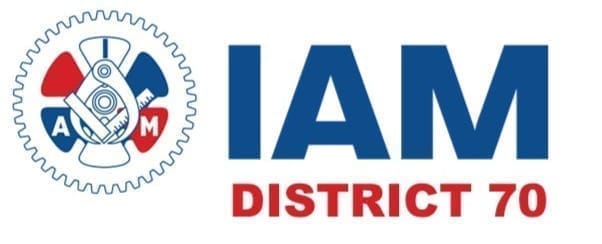Winning Public Support: The Working People Weekly List

Every week, we bring you a roundup of the top news and commentary about issues and events important to working families. Here’s the latest edition of the Working People Weekly List.
Why Unions Are Striking—and Winning More Public Support Than in 50 Years: “The U.S. is experiencing an unusual surge of strikes—10,000 John Deere workers went on strike in October, and so did 1,400 Kellogg workers, and now 35,000 Kaiser Permanente healthcare workers are threatening to walk out. Workplace experts generally point to two reasons for this surge. First, after working so hard and often risking their lives during the pandemic, many workers believe that they deserve better pay and treatment. Second, American workers—especially long-underappreciated essential and low-wage workers—are suddenly feeling empowered because of today’s labor shortage.”
Alabama Coal Miners Protest BlackRock in NYC: “Striking miners from Alabama protested outside BlackRock headquarters in New York on Thursday, demanding higher wages and better working conditions.”
The Working Class Is on Strike: “Across the country we are witnessing a historic strike wave, with over 22,000 US union members on strike right now. From our BCTGM Local 374G right here in Lancaster, Pennsylvania, on strike against the greed of Kellogg’s, to the 10,000 UAW workers at John Deere plants walking off the factory floor, the Ironworkers Regional Shop Local 851 on strike against Erie Strayer Company in northwestern Pennsylvania, or the 24,000 health care workers at Kaiser Permanente on the west coast who have overwhelmingly authorized a strike, workers have had enough, and they are taking action. For years the working class in this country [has] been pushed to the brink, while corporate bosses and shareholders have reaped nearly all the benefits of their labor.”
The Labor Shortage Is Reshaping the Economy, and How People Talk About Work. Here’s a Glossary of All the New Phrases That Sum Up Workers’ Frustration with Their Deal: “Importantly, there’s a mismatch between businesses saying they’re eager to hire and who’s still out of work. For instance, in August, the Black unemployment rate went up, even as businesses said they were scrambling to hire. It’s what Dr. William Spriggs—an economics professor at Howard University and the chief economist for the AFL-CIO—said was ‘the self-evident discrimination in the labor market revealing itself.’ The Black unemployment rate ticked a bit in September, but still remains elevated.”
Labor Is Having a Moment in Colorado and Beyond, but Will That Lead to More Unionized Workers?: “A vote on a union at an Aurora HelloFresh site is seen as a test of labor’s ability to flex its muscles at a time when workers are hard to find and union members who’ve been on the front lines in the pandemic are now on the picket line, seeking better conditions and pay. The mail-in vote at the HelloFresh facility in Aurora, where about 350 employees are eligible to cast ballots, started Oct. 28 and will run through Nov. 22. About 900 HelloFresh employees in Richmond, California, will start voting Nov. 18. The number of worksites, both in Colorado and across the county, wanting to organize seems to be growing by the week. ‘I know it’s a moment for labor, but it’s actually a moment for workers,’ said Robert Lindgren, Colorado AFL-CIO political and organizing director. ‘I’m seeing people reexamining why they work at a given place and trying to find the best possible opportunity for them and their families.’”
Local Labor Union Helps Albuquerque Seniors with Heating: “It’s that time of year when people start cranking up the heat in their homes, but that can be hard for seniors and people with disabilities. Members of the United Association of Plumbers and Pipe Fitters Local Union 412 got ready Saturday morning to head out and help the community. ‘All the folks here—there’s about one hundred hands here today, and it’s a volunteer day for them. This is 100% out of the kindness of their heart. They chose to show up this morning. They’ll go out all day, work their butts off and help the community,’ said Courtenay Eichhorst, union business manager.”
AFL-CIO Housing Investment Trust Marks 100 Minnesota Projects: “The AFL-CIO Housing Investment Trust (HIT) announced today it reached the milestone of investing $1.6 billion in 100 construction projects in Minnesota. This achievement has contributed to the HIT’s track record of producing competitive returns for its investors since its inception in 1984, while generating important social impacts. In Minnesota, these have included about 22.8 million hours of well-paying union construction work; 13,142 new units of sorely needed housing that is 47% affordable; and transformative growth with total economic impacts of $4.8 billion.”
‘Striketober’ Isn’t a Sign of Chaos—It’s a Healthy Development for the Country: “The picket line has been crowded lately. Tens of thousands of workers are on strike, including nurses in Massachusetts, United Auto Workers at John Deere, coal miners in Alabama, metal workers in West Virginia, hospital workers in New York, ironworkers in Pennsylvania and Kellogg’s workers in four states. I recently walked the picket line with Keith Bragg, Darlene Carpenter and other members of the Bakery, Confectionery, Tobacco Workers and Grain Millers International Union Local 358 in Richmond. They saw Nabisco making record profits while trying to weaken health coverage for new hires. Bragg and Carpenter told me they refused to sell out their younger colleagues through a two-tiered system—and after a five-week strike, they won a contract that preserved good benefits for all.”
Survey Shows Broad Public Support for Worker Strikes: “Workers at companies like Kellogg’s, Nabisco and John Deere have hit the picket lines in recent weeks hoping to get a better deal from their employers. A new survey suggests the public by and large supports them. The AFL-CIO labor federation commissioned the progressive pollster Data for Progress to take the public’s temperature on the strikes that have made headlines this summer and fall. The online survey of nearly 1,300 likely voters asked if they ‘approve or disapprove of employees going on strike in support of better wages, benefits, and working conditions.’ Seventy-four percent of respondents either strongly approved or somewhat approved of the strikes, while just 20% strongly disapproved or somewhat disapproved of them. Six percent did not have an opinion.”
What the Labor Movement Needs to Keep ‘Striketober’ Going, According to New AFL-CIO Leader Liz Shuler: “‘They’ve had enough,’ Shuler says of the season, which many have dubbed ‘Striketober.’ But as ripe as the current labor market conditions are for successful strikes, the current moment is also a critical juncture for the future existence of the very labor unions that make such revolts possible. Private sector union membership has fallen from roughly 32% in 1960 to 6% today, and stands to decline even more as older generations—who are more likely than younger ones to be in unions—near retirement age. ‘This is the challenge of our time. Something like 10,000 people a day are retiring,’ Shuler says, ‘and that silver tsunami is about to hit us.’ Shuler spoke with TIME about what the workers participating in this historic wave of strikes are fighting for, how union membership can help them get it, and what the AFL-CIO is doing to bolster its ranks—especially with young people—to preserve its collective bargaining power in the decades to come.”
Outside Hotlines for Athletes Are a Sign of Strained Trust in Sports: “The NWSL players’ union, for instance, is paying about $50 a month, said Meghann Burke, its executive director. Burke said the association, a new affiliate of the AFL-CIO, had initially asked the league to include an anonymous third-party hotline in its anti-harassment policy, adopted earlier this year, because of ‘the lack of trust the players have in the league handling these complaints.’”
Kenneth Quinnell
Mon, 11/08/2021 – 13:11
